 | BOOK DETAILS Title: Dorchester Remembers the Great War Author: Brian Bates RRP: £12.99 Publication date: 23 June 2012 Format: 245 x 168 mm Number of pages: 288 Illustrations: 96 Map: 1 ISBN: 9781906651-169 *This title is now only available from the author. Please contact us for details* |
During the Great War of 1914–18 over 1100 men enlisted from the small market town of Dorchester. They served in such diverse theatres of war as France, India, Mesopotamia and Russia. Most of them survived that terrible conflict and returned home to tell their own unique stories. Those who did not are commemorated on the Borough’s war memorials and in its two cemeteries.
Dorchester Remembers gives a voice to those men and one woman who did not return. Through their poignant personal stories, the effect the war had on each individual and their families is revealed. But more than this, their stories weave together into a fascinating social history that shines light on the impact the war had on the very fabric of Edwardian Dorchester. The town once had the largest prisoner-of-war camp in Britain and an important military presence, yet signs of this have all but disappeared. This book brings it all to life, with an endearing look at the community of Dorchester through the Great War years.
Buried in a foreign land, Their grave we will never see.
But deep within our hearts, We’ll keep their memory.
PREFACE
On Remembrance Sunday 2005 I stood before Dorchester’s main war memorial where just a few minutes previously several hundred people had gathered, with representatives of numerous organisations, civic dignitaries and clergy. Now the service was over, the prayers had been said, the wreaths laid and the Last Post played. The crowed had dispersed, except for two or three lingerers who, like me, were standing before the list of names of those who had died in the Great War. As my eyes passed down the list, noting the various Forces in which they had served, I wondered just who all these people were. Occasionally a surname was repeated, raising the question as to how they were related, if at all. What were the circumstances of their deaths? Were they killed in battle or did they die of illness? Where did they die? I recognised a few names that might have been members of well-known local families but by far the majority were not familiar to me. Then and there, I decided to find out more about them, and those on Dorchester’s other memorials, for surely each person named must have a story to tell.
The usual avenues of WWI military and genealogical sources produced what I expected. The men and one woman named on Dorchester’s memorials came from all walks of life and included every rank, from Colonel to Private. There were several familial relationships; brothers, fathers, sons, uncles, nephews and cousins. Local newspapers and books were a good source of material, and descendants of the families provided me with invaluable information and made available family treasures.
As the body of the work began to build the nature of the project took on new meaning for me. What started off as an objective collection of facts became a crusade to make their stories known. As one tragic narrative added to another, a picture of individual and collective sacrifice emerged. On many occasions I came across a death that for those concerned seemed particularly saddening, thinking that surely this was the worst case I would encounter, only to find another that dug deeper into the layers of personal despair for the families involved.
My hope is that those who spend time looking at Dorchester’s Great War memorials on future Remembrance Sundays, having read this book may see more than just a name on a list and understand better the sacrifices that were made.
CONTENTS
| Edwardian Dorchester The War Comes to Dorchester The Memorials 1914 – The Battle Front Roll of Honour 1915 - The Battle Front Roll of Honour 1916 – The Battle Front Roll of Honour 1917 – The Battle Front Roll of Honour 1918 – The Battle Front Roll of Honour Post-War Roll of Honour The Unknown Warriors Appendix A – Organisation of the British Army Appendix B – Former Place Names in Dorchester Sources About the Author Map of Dorchester (circa 1901) | 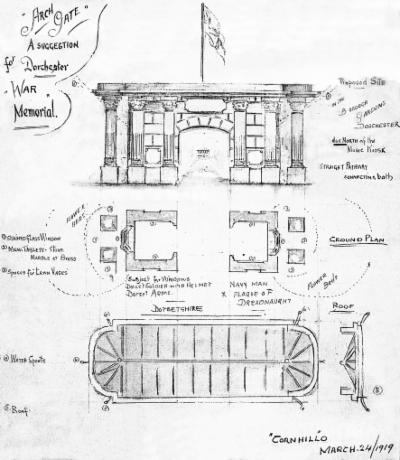 |
EXTRACTS FROM THE BOOK
When the next issue of the Chronicle was published, on 6 August, 2 days after Britain entered the conflict, the Dorchester pages were dominated by war matters, signalling the whirlwind that was to radically affect all aspects of life in the county town. Six months later the newspaper was able to comment that, ‘The War has changed our habits along with our mood. Instead of a round on the golf links, a spin with the motor cycling club, a trip to Bournemouth or Weymouth, afternoons are now devoted to sterner stuff, defence of the Motherland.’[3]
Being a garrison town meant that there was always something of a military flavour going on in Dorchester. On 6 July 1914 the men of the 3rd Dorsets assembled at the Depot Barracks before going to their annual training camp on Salisbury Plain, the Dorchester Coy commanded by Capt. H. Duke and Lt G. Symonds, both prominent men in the town. A couple of weeks later a meeting of the Territorial Association, held in Dorchester under the chairmanship of Lt-Col Mount Batten, was informed that the strength of the county force stood at 1,795, but no mention was made of the impending conflict.
The most immediate effect of the War came on the very first day. Hundreds of new recruits, as well as existing regular soldiers, could be seen making their way to and from the Depot Barracks, and ‘Debonair and active recruiting sergeants, flaunting their alluring ribbons’ [4] were abroad in the town, stopping any likely candidates for military service. The Chronicle described Dorchester as being like ‘a leagured town in the bustle, excitement, and the many and varied uniforms seen in the throng, hurrying to and fro’.[5] Members of the Reserve of Officers hurried to the Depot to learn of their new duties and Reservists were reporting to the Barracks to be clothed and armed. One batch of five officers and 100 NCOs and men left by train from Dorchester West Station, on their way to Belfast to join the 1st Dorsets, while others had shorter journeys to training camps in the county or other parts of the country. The continual movement of troops in the town and the need to billet them continued throughout the War and, of course, brought with it its own problems and opportunities for the town’s inhabitants.
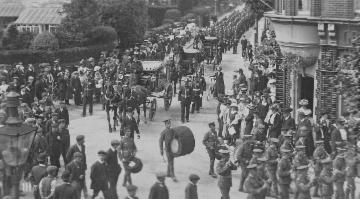 | 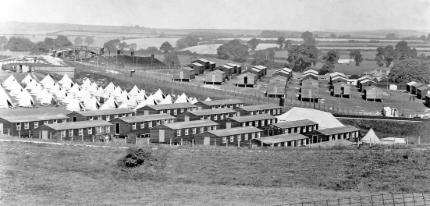 |
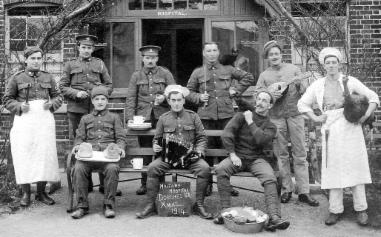 | 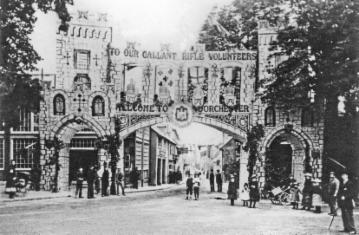 |
ABOUT THE AUTHOR
| Brian Bates has lived in Dorchester with his wife Doreen and two daughters for 41 years. His love of social and economic history was ignited by John Haley, an inspirational schoolmaster, and his particular passion for the history of Dorchester came when he wrote a thesis on the town’s 17th-century economy. For him, ‘real history’ is the story of the ordinary person and their communities, especially when they find themselves in extraordinary predicaments. Brian gives talks on 17th-century Dorchester, and the effects of the Great War on the town, including one of its greatest secrets, the WW1 POW camp. His previous publications have included a transcription of the diary of William Whiteway, a 17th-century Dorchester merchant, and three military biographies. The author’s royalties from this book will be donated to the charities Sense and Sightsavers.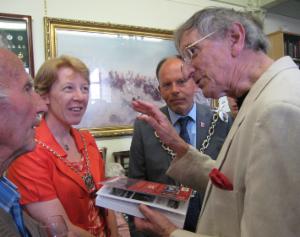 | 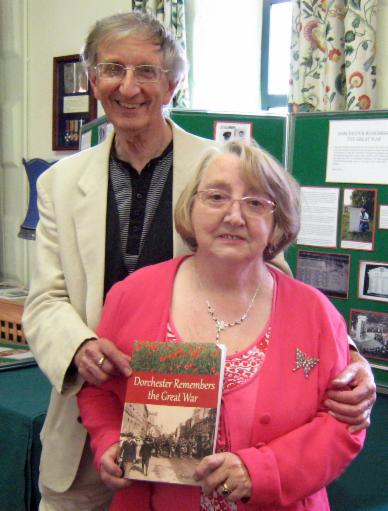 |
WHAT REVIEWERS HAVE SAID
‘in this fine local history…wherever a photo or information is available the author has provided as much biographical and service detail of the men, almost 300 of them, as he could in chronological order. We are always impressed when we receive these local history books with how much diligent research and time has gone into the gathering of the material and the telling of the stories of the fallen. The author is to be congratulated for an outstanding work. 10/10.
The Great War Magazine
‘… many people are feeling the need to search for local and personal connections to 1914 … The book Dorchester Remembers the Great War is an excellent place to start. Brian Bates has traced all those who are commemorated on the WWI memorial in Dorchester, and the result is a fascinating book stuffed full of ordinary and extraordinary local lives.’
Helen Hartely, Dorchester Parish Magazine
Lt Col RJ Wyatt, Stand To, magazine of the Western Front Association
‘a remarkably ambitious research project…This is a well-written and carefully researched account, with numerous illustrations. It includes contemporary views of the town, the barracks, entertainment for the troops and the military hospital established in the house and grounds of Colliton House and Park. There are many photographs of the men who fell and of their families. The book provides an excellent account of Dorchester during the war, the changes which occurred and the reaction of the townsfolk to the stresses and strains of wartime life. Most poignant of all are the stories which the author has collected of the fallen. This is not easy to read. The circumstances of each death and the effect upon the families in Dorchester are heart-rending.’
J.H. Bettey, British Association for Local History
‘The book must have involved massive research, and the list of references is impressive. However, it’s easy to read and includes photos, sketches, a glossary (helpful when I wondered how a Royal Fleet Auxiliary could be serving on the Somme!) and a summary of how the Army was constructed at that time –very useful to a non-military person.’
Army Rumour Service (AARSE)
‘Brian Bates has written a moving tribute to the men and one woman of Dorchester who gave their lives during the First World War. … Dorchester Remembers the Great War is also part social history of the town and a memorial to places long since lost.’
Ruth Meech, Dorset Echo
‘Although the scale of waste of World War I cannot truly be captured by mere numbers, the very real and recognisable human scale of this book make it incredibly powerful. This book is not just a labour of love, but an extraordinary evocation of the lives and deaths of ordinary men recorded in one Dorset town.’
Dorset Life
LINKS
British Association for Local History
ORDERING
Please CLICK HERE for ordering options